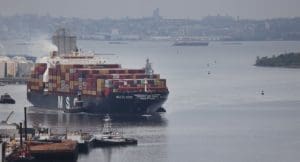 Earlier this week, I was listening to Morning Addition on WBUR Boston. One of the guests was discussing the new words that were added to the Merriam Webster dictionary in September. In all, 370 new words were added. When many people use a word in the same way, over a long enough period of time, that word becomes eligible for inclusion. As is often the case, many of the new words were slang terms that have worked their way into the American lexicon. Some of those included slang words such as yeet (used to express surprise, approval, or excited enthusiasm); sus (suspicious); adorkable (socially awkward or quirky in a way that is endearing); and MacGyver (to make, form, or repair (something) with what is conveniently on hand). However, the most surprising new addition, at least to me is supply chain (the chain of processes, businesses, etc. by which a commodity is produced and distributed: the companies, materials, and systems involved in manufacturing and delivering goods). I was beyond shocked that supply chain had never been in the dictionary before. But I guess the pandemic brought the topic to the forefront of conversations, making it eligible. You learn something new every day. And now on to this week’s logistics news.
Earlier this week, I was listening to Morning Addition on WBUR Boston. One of the guests was discussing the new words that were added to the Merriam Webster dictionary in September. In all, 370 new words were added. When many people use a word in the same way, over a long enough period of time, that word becomes eligible for inclusion. As is often the case, many of the new words were slang terms that have worked their way into the American lexicon. Some of those included slang words such as yeet (used to express surprise, approval, or excited enthusiasm); sus (suspicious); adorkable (socially awkward or quirky in a way that is endearing); and MacGyver (to make, form, or repair (something) with what is conveniently on hand). However, the most surprising new addition, at least to me is supply chain (the chain of processes, businesses, etc. by which a commodity is produced and distributed: the companies, materials, and systems involved in manufacturing and delivering goods). I was beyond shocked that supply chain had never been in the dictionary before. But I guess the pandemic brought the topic to the forefront of conversations, making it eligible. You learn something new every day. And now on to this week’s logistics news.
- Railroad strike averted
- Amazon is buying Cloostermans
- First drone earns FAA type certificate
- Container dwell fee paused at Port of New York and New Jersey
- France clamps down on delivery depot ‘dark stores’
- Upset by high prices, GM’s Cruise develops its own chips for self-driving cars
- FedEx customers in US face earlier holiday deadlines
 After around-the-clock negotiations, President Joe Biden said Thursday that freight railway companies and workers had reached a tentative agreement that will avert a rail shutdown that could have paralyzed the economy. Biden celebrated the deal alongside union leaders and rail executives at the White House Rose Garden, calling it a “big win for America” and for both sides of the labor dispute. He said rail workers will receive better pay, improved working conditions and a “peace of mind” over health insurance, while companies will strengthen their ability to recruit and retain workers. “Together we reached an agreement that will keep our critical rail system working and avoid disruptions of our economy,” the president said, characterizing the deal as “validation” that unions and management “can work together.”
After around-the-clock negotiations, President Joe Biden said Thursday that freight railway companies and workers had reached a tentative agreement that will avert a rail shutdown that could have paralyzed the economy. Biden celebrated the deal alongside union leaders and rail executives at the White House Rose Garden, calling it a “big win for America” and for both sides of the labor dispute. He said rail workers will receive better pay, improved working conditions and a “peace of mind” over health insurance, while companies will strengthen their ability to recruit and retain workers. “Together we reached an agreement that will keep our critical rail system working and avoid disruptions of our economy,” the president said, characterizing the deal as “validation” that unions and management “can work together.”
 Amazon has made a string of startup acquisitions over the years to build out its robotics business; now, the company is taking an interesting turn in that strategy as it expands its industrial warehouse capabilities. Amazon is acquiring Cloostermans, a company out of Belgium that is a specialist in mechatronics. In case you’re unfamiliar with that term, mechatronics is a multidisciplinary field that refers to the skill sets needed in the contemporary, advanced automated manufacturing industry. Mechatronics has been building technology to move and stack heavy pallets and totes, and robotics used to package products for customer orders. Amazon has been using those products as a customer of Cloostermans’ since 2019 for e-commerce operations; it’s making the acquisition to ramp up its R&D and deployment in that area. Amazon is not disclosing the financial terms of the deal, but it will see some 200 machinists, engineers and others from Cloostermans join Amazon.
Amazon has made a string of startup acquisitions over the years to build out its robotics business; now, the company is taking an interesting turn in that strategy as it expands its industrial warehouse capabilities. Amazon is acquiring Cloostermans, a company out of Belgium that is a specialist in mechatronics. In case you’re unfamiliar with that term, mechatronics is a multidisciplinary field that refers to the skill sets needed in the contemporary, advanced automated manufacturing industry. Mechatronics has been building technology to move and stack heavy pallets and totes, and robotics used to package products for customer orders. Amazon has been using those products as a customer of Cloostermans’ since 2019 for e-commerce operations; it’s making the acquisition to ramp up its R&D and deployment in that area. Amazon is not disclosing the financial terms of the deal, but it will see some 200 machinists, engineers and others from Cloostermans join Amazon.
 The Matternet M2 has become the first non-military unmanned aircraft system (UAS/drone) to earn its FAA type certificate. In an announcement on Wednesday, drone delivery system developer Matternet stated that the M2 underwent four years of evaluation by the FAA prior to certification. The company noted that the M2, along with several other drone models, has been used in the U.S. for Part 135 on-demand air carrier operations under an exemption while being evaluated. The Matternet M2 is designed to carry payloads of up to 2 kilograms (4.4 pounds) and 4 liters over distances of up to 20 kilometers (12.5 miles). The company partnered with UPS to launch the first revenue drone delivery operations in the US in 2019.
The Matternet M2 has become the first non-military unmanned aircraft system (UAS/drone) to earn its FAA type certificate. In an announcement on Wednesday, drone delivery system developer Matternet stated that the M2 underwent four years of evaluation by the FAA prior to certification. The company noted that the M2, along with several other drone models, has been used in the U.S. for Part 135 on-demand air carrier operations under an exemption while being evaluated. The Matternet M2 is designed to carry payloads of up to 2 kilograms (4.4 pounds) and 4 liters over distances of up to 20 kilometers (12.5 miles). The company partnered with UPS to launch the first revenue drone delivery operations in the US in 2019.
 The Port Authority of New York and New Jersey did not go live with a proposed container dwell fee, which was set to start on September 1, as it works to update the language on the tariff. A rise in cargo volumes and idling empty containers led the port to propose a dwell fee in August in hopes it would speed throughput. But the fee was subject to a public comment period, during which ocean carriers said such a tariff would bring “unintended consequences.” The fee is now paused until the port reworks the language in the tariff. The port authority is “still committed to a tariff container imbalance fee but it won’t be the exact one originally proposed.”
The Port Authority of New York and New Jersey did not go live with a proposed container dwell fee, which was set to start on September 1, as it works to update the language on the tariff. A rise in cargo volumes and idling empty containers led the port to propose a dwell fee in August in hopes it would speed throughput. But the fee was subject to a public comment period, during which ocean carriers said such a tariff would bring “unintended consequences.” The fee is now paused until the port reworks the language in the tariff. The port authority is “still committed to a tariff container imbalance fee but it won’t be the exact one originally proposed.”
Faced by growing protests from local people as well as city authorities, President Emmanuel Macron’s government has decreed that dark stores be classified as warehouses, rather than as shops – meaning that in Paris and other cities most will probably be forced to close. Run by half a dozen competing companies such as Gorillas, Cajoo, Getir, Flink and Gopuff, “dark stores” have proliferated in France as elsewhere over the last two years after Covid confinement popularized internet food shopping. But residents of buildings where “dark stores” have replaced pre-existing grocery shops are angry about noise from early morning lorries and the disruption caused by squads of deliverers on electric bicycles and scooters.
 General Motors’ autonomous driving unit Cruise has developed its own chips for self-driving cars to be deployed by 2025, as they aim to bring down costs and scale up volume. Cruise is taking a page out of Tesla’s playbook, switching from Nvidia Corp’s products to customized chips to power their vehicles. Cruise executives this week for the first time have given details about its custom chips that will power its Origin vehicle with no pedals or steering wheel. Cruise had developed four in-house chips so far – a computing chip called Horta, the main brains of the car, Dune which processes data from the sensors, a chip for the radar, and one that it would announce later.
General Motors’ autonomous driving unit Cruise has developed its own chips for self-driving cars to be deployed by 2025, as they aim to bring down costs and scale up volume. Cruise is taking a page out of Tesla’s playbook, switching from Nvidia Corp’s products to customized chips to power their vehicles. Cruise executives this week for the first time have given details about its custom chips that will power its Origin vehicle with no pedals or steering wheel. Cruise had developed four in-house chips so far – a computing chip called Horta, the main brains of the car, Dune which processes data from the sensors, a chip for the radar, and one that it would announce later.
US shippers using FedEx Corp.’s surface transport offerings to move their peak-season shipments will have to comply with earlier cutoffs than last year if they expect them to arrive by Christmas. FedEx has set a December 14 deadline for shippers using its FedEx Ground and Home Delivery services. Last year’s cutoff date was December 15. The cutoff for shipments tendered this year under FedEx’s Ground Economy service is December 8. Last year’s cutoff was set at December 9. The Economy service is slower and less expensive than FedEx’s other ground offerings. The cutoff dates apply to shipments moving within the lower 48 states and Alaska and Hawaii. Two of FedEx’s LTL services, FedEx Freight Priority and FedEx Direct, where shipments are delivered straight to residences, also have December 14 cutoff dates — one day earlier than last year. Deliveries made through FedEx Express, the company’s air and expedited services, will have the same cutoffs as last year. Depending on the specific service, the cutoffs will range from December 20 to December 23.
That’s all for this week. Enjoy the weekend and the song of the week, Alphabet Aerobics by Blackalicious.
















